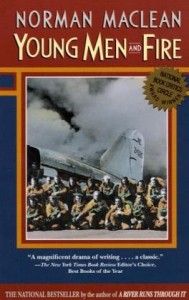Norman Maclean and the Christian Tragedy

The most recent issue of Commonweal includes “The River Runs On: Norman Maclean’s Christian Tragedies,” a long-form piece by Timothy B. Schilling, who goes on to read Maclean (expectedly, given the title) through both Christianity and tragedy—but most compellingly, through the author’s own often contradictory and ambivalent relationship to religion. You can read the piece in full here; a brief excerpt from Young Men and Fire that situates the Smokejumpers—first responders to the Mann Gulch fire of 1949, from which the book takes its name— in this context follows below.
Maclean tells us that most of the Smokejumpers believe in God. “You wouldn’t dare jump,” they say, “if it was empty out there.” But of the sixteen who descended to fight the fire, only three survived. What then—for them, for us—is the last word in this story? Does the Mann Gulch fire reveal the ultimate tragedy of all human experience? Or does it enjoin us to embrace the world’s faith traditions in looking for a life and a truth beyond death? As in A River Runs Through It, Maclean counters fatalism with Christian symbols and biblical allusions, including references to the Stations of the Cross, the Mass, Calvary, and the Book of Job. He also calls again on Psalm 23. But perhaps the most telling biblical reference in Young Men and Fire is the scorched deer included in the “Black Ghost” section. This image, reinforced in a photograph, calls to mind Psalm 42: “As a deer longs for running streams, so longs my soul for You, O God.” Here, as in Maclean’s earlier book, the river is a potential source of relief and rescue—not the Big Blackfoot this time, but the Missouri, sporadically “glaring” through the smoke and trees. The ambivalence is typical of both of his books and very much to Maclean’s point; it sharpens our sense of the tragedy without “answering” it in any definitive way.
To read more about Young Men and Fire, click here.
To read editorial director Alan Thomas’s essay on working with (the ghost of) Maclean, click here.